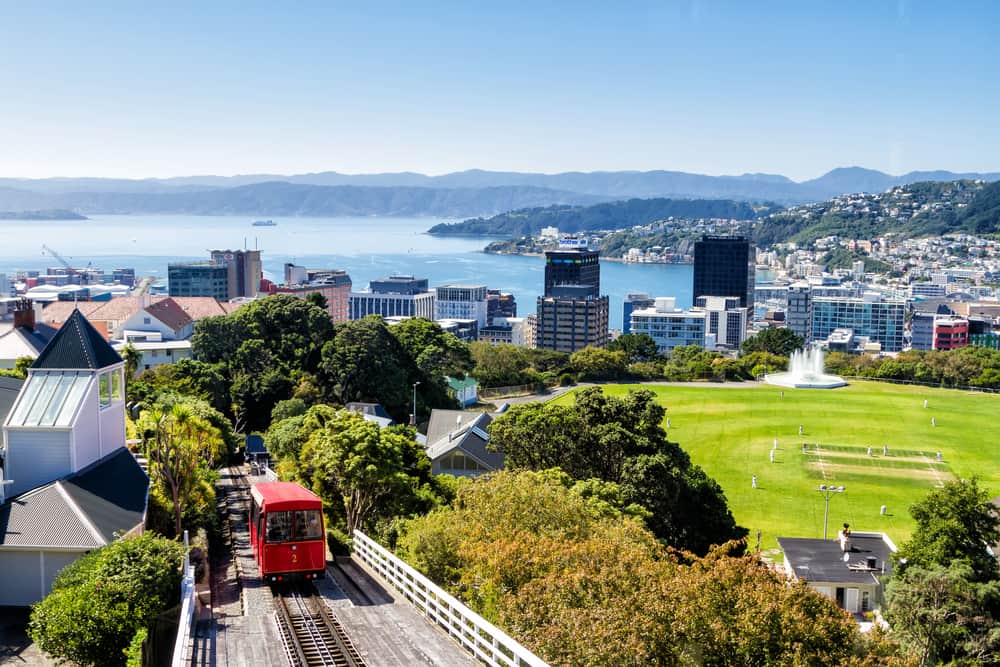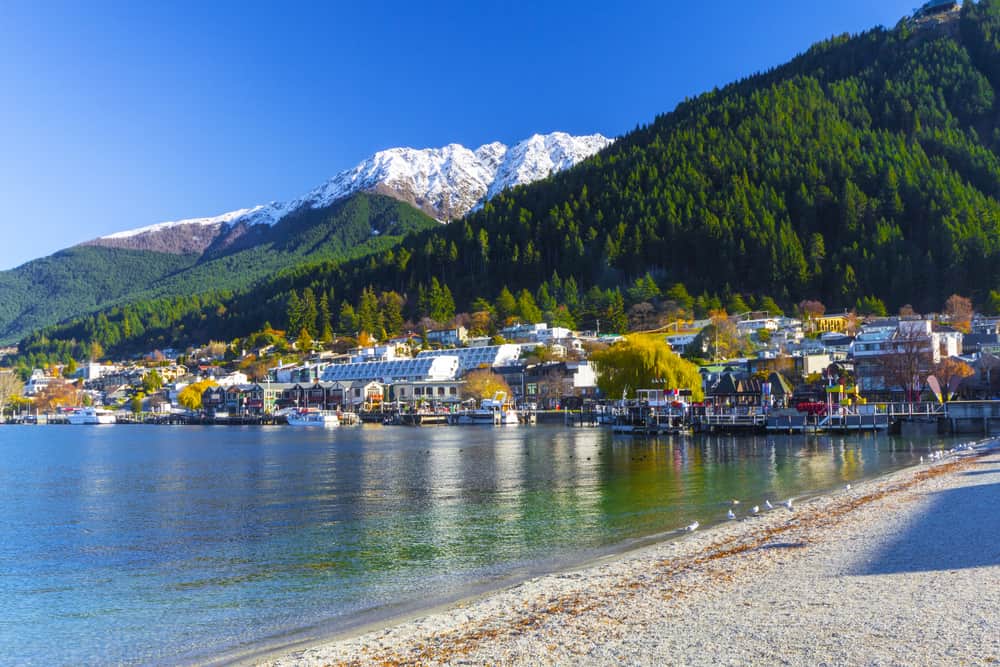Having a baby in New Zealand as a non-resident
Find out how much having a baby in New Zealand as a non-resident costs, including hospital fees, health insurance and other expenses.

Dreaming of spending your post-work years surrounded by stunning natural landscapes? If so, New Zealand could be the retirement destination for you.
This breathtakingly beautiful country attracts expats from all over the world, all drawn by the high quality of life, friendly people and relaxed lifestyle on offer in NZ. In fact, there are estimated to be around 60,000 UK retirees living there at present¹.
If you’re looking into retiring to New Zealand from the UK, read on. We’ve put together a full guide covering everything you need to know, from the most popular NZ spots for UK expats to visas, money and more.
We’ll even throw in a super handy tip for managing your money across borders. Open a Wise multi-currency account and you can easily and securely send money to New Zealand to cover relocation costs - all for tiny fees and the real, mid-market exchange rate. Plus, you can spend in NZD from the moment you land on Kiwi shores using your Wise debit card.
But more on this later. Let’s start with some of the many reasons you might be looking at New Zealand for your retirement.
It’s easy to see why New Zealand is such a popular destination for retirees. In terms of cost of living, it’s roughly on a par with the UK² - if a little higher in some areas. However, NZ has many other benefits that Britain just can’t offer. For example:
Climate and scenery. New Zealand has some of the most beautiful natural scenery in the world, along with a mild climate. It’s much less crowded than the UK, so you’ll enjoy plenty of personal space, even if you move to one of its bigger cities.
Quality of life. New Zealand is often associated with peaceful, laid-back lifestyles, along with excellent food and drink, and very friendly people. And it’s the perfect destination for lovers of outdoor activities, with plenty of opportunities for hiking, climbing, sailing and more.
Good public healthcare system. According to a 2019 report, New Zealand’s healthcare system was rated 18th best in the world³ - sharing its ranking with the UK. Healthcare is always something to bear in mind as a retiree, and we’ll look into whether UK expats living in NZ can access the country’s subsidised state healthcare system later in this guide.
And of course, there’s the shared language and culture, although New Zealand has now developed a unique culture of its own with Polynesian along with British influences.
The short answer to this is yes. New Zealand is welcoming to expats and retirees from the UK and around the world, and is known to be friendly and accommodating to foreigners. The most crucial thing to do is check whether you’re eligible for a visa, which we’ll look at in more detail later in this guide.
Let’s take a closer look at some of the best places for UK retirees in New Zealand:

A diverse and vibrant city, Wellington was named the second best city in the world for high quality of life⁴, only beaten by Zurich. The cost of living here is cheaper than other major NZ cities like Christchurch or Auckland, and property is reasonably affordable.
New Zealand’s capital on the North Island has a great public transport system, low pollution levels and plenty of parks, gardens, bars and restaurants. It’s a great-looking city with friendly people, a choice of charming independent shops and businesses, and plenty of festivals and events to get involved in.

Also on the North Island, Auckland is New Zealand’s biggest city and one of the best connected for flights back to the UK. It’s a beautiful coastal spot, ideal for days spent on the beach or strolling along pretty harbours.
But Auckland is also known for its world-class food and wine, fabulous shopping and a vibrant arts and culture scene. In a nutshell, Auckland combines natural beauty with exciting city living.

Christchurch is a fascinating city with a strong British presence, but it has an innovative personality all of its own. Here, you’ll find an accessible housing market, lots of parks, beaches and dining options, and plenty of natural wonders and outdoor activities right on its doorstep. It also has a nice flat and compact city centre, so it's easy to get around - whether on foot or the city’s excellent public transport system.
Christchurch is on New Zealand’s South Island, so has a slightly cooler climate and winters can be (or at least feel) very long.

If you’re a fan of adventure in the great outdoors, Queenstown on South Island is the ideal retirement destination for you. This small resort town is famous for its natural beauty, scenic views and outdoor lifestyle, along with world-class entertainment - from snow sports and water-based activities to cruises, hiking and dining.
Diverse Queenstown is home to expats from all over the world, making it an attractive and welcoming place to live if you’re a UK retiree.

Looking for a relaxed, laid-back lifestyle in New Zealand? Hawkes Bay on the East Coast of the North Island is known for fantastic weather, award-winning wine, weekend farmer’s markets and seasonal events. There are many towns and villages to choose from at this coastal retreat, from the seaside town of Napier to the green winery and orchard city of Hastings.
Now that you’ve started your research on where to retire to in New Zealand, let’s run through a few of the other key things you need to know before moving there:
Pensions. You can claim your UK state pension in New Zealand, by applying at the International Pension Centre. You may also be able to transfer over personal pensions, but make sure you choose a Qualifying Recognised Overseas Pension Scheme (QROPS) in New Zealand or you could face an eye-watering tax bill.
Taxes. The good news for new arrivals in New Zealand is that you may not have to pay tax on UK or other overseas income for your first four years⁵. The UK and New Zealand also have a double taxation agreement⁶, so you won’t pay tax on your income twice.
Healthcare. The UK and New Zealand have a reciprocal agreement on healthcare⁷. This means that UK citizens on a short/temporary stay may be eligible for free or low cost state healthcare services. You may also be eligible if you have a resident visa, and of course if you become a permanent resident. More information on eligibility for NZ state healthcare can be found here.
Property. You can only buy a home in New Zealand as a foreigner if you have a residence class visa⁸. If you only have a temporary visa, you will need to rent a property.
So, how can you emigrate to New Zealand if you are retired? To answer this question, the most important thing to look at is visas.
There are two types of visa you can get as a UK retiree looking to settle in New Zealand. Let’s take a look at each option and the requirements for applicants:
The Parent Retirement Resident Visa is designed for those with an adult child who is a permanent resident or citizen of New Zealand. This visa requires an investment of at least 1 million NZD, sustained over a four-year period. You can travel in and out of the country for the first two years of this period, and you can bring your partner with you. Once the four years is up, you can apply for permanent residency and all travel restrictions will be lifted.
While this is a retirement visa, you can still work or study (or both) during your time in New Zealand.
To apply for this visa, you’ll need to provide valid ID, proof of investment funds and other documentation - the full list of conditions is available here.
Don’t have family connections to New Zealand? If you have money to invest, you can apply for the Temporary Retirement Visa. If you’re over 66 years old and can keep at least 750,000 NZD invested in New Zealand for two years, you could be eligible for this visa.
You can include your partner in your application, but not any dependent children. Once the two years are up, you can apply for another Temporary Retirement Visa. With this visa, you can complete a short course of study during your stay in New Zealand, but you’re not allowed to work.
To apply for this visa, you’ll need to show evidence of health insurance, enough money to support yourself during your stay, proof of investment funds and valid ID, along with other documentation. The full list of requirements is available here.
Moving to a new country is never simple and straightforward. But to help you with your preparations, here are some of the main items to add to your to-do list:
So, you’re almost ready to make your preparations to move to New Zealand. There’s just one more thing to sort out - how you’ll manage your money across borders.
Open a Wise multi-currency account and you can send money between the UK and New Zealand without getting stung by bank fees, currency conversion charges and poor exchange rates. With Wise, you’ll only pay a tiny fee to send over the deposit for your NZ rental property or to apply for your visa.
Better still, you’ll always get the real, mid-market exchange rate and Wise keeps your money safe and secure.
And when you arrive, you can spend like a local immediately with your Wise debit card. This clever contactless card automatically converts the currency to NZD at the fairest exchange rate, for just a small fee.
So, that’s pretty much it - everything you need to know about retiring to New Zealand from the UK. We’ve covered places to live, visas, pensions, healthcare and much more, so you should be all set. You can now start the exciting process of planning your big move, good luck!
Sources used for this article:
Sources checked on 4th May 2021
*Please see terms of use and product availability for your region or visit Wise fees and pricing for the most up to date pricing and fee information.
This publication is provided for general information purposes and does not constitute legal, tax or other professional advice from Wise Payments Limited or its subsidiaries and its affiliates, and it is not intended as a substitute for obtaining advice from a financial advisor or any other professional.
We make no representations, warranties or guarantees, whether expressed or implied, that the content in the publication is accurate, complete or up to date.

Find out how much having a baby in New Zealand as a non-resident costs, including hospital fees, health insurance and other expenses.

Read our helpful guide on how to transfer a UK pension to New Zealand, including the steps, fees and taxes involved.

The complete guide to buying property in New Zealand as a Brit, including the latest NZ property prices.

If your dream is settling in a developed country, while still being connected to nature, New Zealand is the place to be. The idyllic islands are a real-life...

Your complete guide to moving to New Zealand from the UK, including: visas, living costs and how to search for housing and jobs.

Everything you need to know about getting a New Zealand retirement visa, from how much it costs to how to apply.